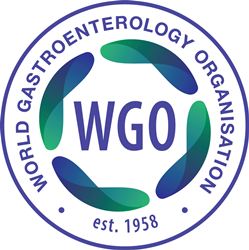
The purpose of this update to the WGO guideline is to summarize and review the evidence from a number of new guidelines that outline best practice and to suggest how these principles may be applied around the world using the ‘cascades’ approach.
MILWAUKEE (PRWEB)
August 09, 2021
The World Gastroenterology Organisation (WGO) has announced the release of the updated Helicobacter pylori Guideline. This guideline is chaired by Prof. Peter Katelaris of Concord Hospital, University of Sydney, Australia and Prof. Richard Hunt, Professor Emeritus, McMaster University and Farncombe Family Digestive Health Research Institute, Hamilton, Ontario, Canada.
The guideline was created with the global view of many Guideline Review Team members, which, in addition to Professors Katelaris and Hunt, includes Franco Bazzoli (Italy), Henry Cohen (Uruguay), Kwong Ming Fock (Singapore), Manik Gemilyan (Armenia), Peter Malfertheiner (Germany), Francis Mégraud (France), Alejandro Piscoya (Peru), Duc Quach (Vietnam), Nimish Vakil (USA), and Louis G. Vaz Coelho (Brazil). Anton LeMair of The Netherlands served as guidelines consultant. The guideline can be accessed at https://www.worldgastroenterology.org/guidelines/global-guidelines/helicobacter-pylori.
In introducing this guideline, Prof. Katelaris stated, “Helicobacter pylori continues to be a major health problem worldwide, causing considerable morbidity and mortality due to peptic ulcer disease and gastric cancer. The burden of disease falls disproportionately on less well-resourced populations. As with most infectious diseases, the greatest impact on reducing this burden comes from improvements in socioeconomic status, which interrupt transmission. This has been observed in many regions of the world, but the prevalence of infection remains high in many regions in which improvements in living standards are slow to occur.”
WGO guidelines uniquely feature cascades, which are intended to highlight appropriate, context-sensitive and resource-sensitive management options for all geographical areas, regardless of whether they are “developing,” “semi-developed,” or “developed.” WGO cascades are context-sensitive, and the context is not necessarily defined solely by resource availability.
It is a major challenge for guidelines to achieve relevance across a wide variety of populations with varying spectrums of disease and with vastly different resources with which to deal with it.
As Prof. Hunt added: “The purpose of this update to the WGO guideline is to summarize and review the evidence from a number of new guidelines that outline best practice and to suggest how these principles may be applied around the world using the ‘cascades’ approach. This approach recognizes variations in the regional prevalence and impact of infection, and the vast differences in health resources available to address the problem, which require pragmatic, tailored local approaches. The burden of disease wrought by H. pylori falls disproportionately on less well-resourced regions, which are insufficiently represented in epidemiological surveys and are often not the focus of clinical guidelines.”
WGO has a library of 27 global guidelines, which are written from a viewpoint of global applicability. Each guideline goes through a rigorous process of authoring, editing and peer review, and is as evidence-based as possible. WGO is the only organization whose guidelines have adopted a global focus. Each WGO guideline is available in English, French, Mandarin, Portuguese, Russian and Spanish, and is updated as new information and evidence is discovered. The Global Guidelines Committee meets each year to discuss updating and creating new guidelines and consists of 30-plus members from around the globe.
ABOUT THE WORLD GASTROENTEROLOGY ORGANISATION
Formed in 1935 and incorporated in 1958, The World Gastroenterology Organisation (WGO) is a federation of 117 member societies and 4 regional associations of gastroenterology representing more than 50,000 individual members worldwide, focusing on the improvement of standards in gastroenterology training and education on a global scale. The WGO Foundation, incorporated in 2007, is dedicated to raising funds to support WGO educational programs and activities. For more information, contact: info@worldgastroenterology.org.
###
Share article on social media or email:

